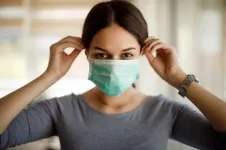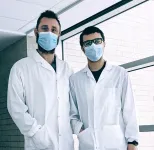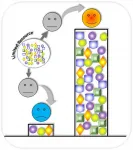Study finds Americans went out more after face mask mandates
hether this has exposed Americans to more risk is still a question
2021-02-08
(Press-News.org) Face masks mandates have led people to spend less time at home, but whether this has exposed Americans to more risk is still a question, according to a new study published Thursday in Scientific Reports.
Using anonymized location data from smart devices, the study, conducted by Yale School of the Environment Professor Eli Fenichel, Youpei Yan, YSE postdoctoral associate, Colorado State University Assistant Professor Jude Bayham and Aaron Richter, a Yale research affiliate, examined changes in behavior of residents two weeks before and two weeks after mask mandates were implemented in regions of the United States.
The study found that residents spent between 11-24 more minutes outside their homes after a facemask mandate was issued, even as COVID-19 rates were rising in the U.S. They increased trips to a variety of places -- most often restaurants and other eateries, and to recreational locations including parks. These were likely trips that they were not making before the mask mandate.
When everyone was expected to wear a mask, people perceived a lower risk associated with leaving home and visiting public locations, the study reported.
Whether this increased or reduced infections is an open question, both are possible, Fenichel said. Central to the study is the question, are masks effective enough to offset the risks of exposure people encounter by increasing time outside of their homes. The answer depends upon the relative effectiveness of masks, proper usage, and other behaviors. Cases of COVID-19 increased in some states and decreased in other states despite mask orders, the study noted.
Fenichel, who has studied the economics of human infectious diseases and behavioral responses including during the H1N1 pandemic, said he was interested in examining the issue after colleagues, friends and family mentioned last spring that they were going out to public places "but they would wear a mask." He said he wanted to delve into whether requiring masks -- that provide protection primarily for other people -- were prompting people to engage in activities that could be riskier for themselves than just staying home and whether mask wearing out of the house offset the risks equal to the time that would have been spent at home instead.
"It seems like a lot of people felt like the mask was a form of protection for them. So, the question was, were the masks good enough to actually to justify this behavioral shift. I still don't think we know. I still think that there's a lot of uncertainty around that,'' said Fenichel. "Wearing a face mask is hard, it needs to be done correctly too, it's not like putting a string of garlic around your neck to keep vampires away."
It's important to examine how the wide range of non-pharmaceutical interventions interact and prompt other behavioral effects that could worsen the risks of contracting COVID-19, he said.
"I think we need to understand how they interact,'' Fenichel said. "Itisn't that we shouldn't have had facemask mandates. It's really trying to understand how it all works. We need to think about how these things come together. There are no easy answers."
INFORMATION:
[Attachments] See images for this press release:

ELSE PRESS RELEASES FROM THIS DATE:
2021-02-08
A new study of autism risk genes by UC San Francisco and UC Berkeley scientists implicates disruption in prenatal neurogenesis - a process in which specialized "progenitor" cells give rise to new brain cells - in the development of autism spectrum disorders (ASDs). The study also shows that estrogen, perhaps in a form produced within brain cells, can protect against this disruption and steer the brain on a normal course of development.
The most striking findings in the study, published on January 25, 2021 in Neuron, were derived from experiments using embryos of the western clawed frog (Xenopus tropicalis), a species prized by biologists for the unique insights it offers into development. Human genes involved in development ...
2021-02-08
Prompted by the need to improve conventional treatments for people infected with the human immunodeficiency virus (HIV-1), a team from the Institut national de la recherche scientifique (INRS) has identified a therapeutic approach to restore the effectiveness of immune cells. The study, led by doctoral student Hamza Loucif and Professor Julien van Grevenynghe, was published in the journal Autophagy.
Most people infected with HIV-1 require daily antiretroviral therapy to control the infection. These drugs cause significant side effects without fully restoring the normal functioning of the immune system. ...
2021-02-08
SPOKANE, Wash. - Diabetic patients taking the natural product goldenseal while taking the prescription drug metformin may be unwittingly sabotaging their efforts to maintain healthy blood glucose levels. This concern arose from a recent study published in the journal Clinical Pharmacology & Therapeutics.
Metformin--the world's most-prescribed oral glucose-lowering medication--was included in a cocktail of selected drugs given to participants in a clinical study led by scientists at Washington State University's College of Pharmacy and Pharmaceutical Sciences. The study sought to determine the impact of goldenseal on specific ...
2021-02-08
A new study by scientists at Utrecht University and the United Nations University concludes that about half of global wastewater is treated, rather than the previous estimate of 20%. Despite this promising finding, the authors warn that treatment rates in developing countries are still very low. The study and its dataset were published Open Access in the journal Earth System Science Data.
Humans and factories produce vast quantities of wastewater per day. If not properly collected and treated, wastewater may severely threaten human health and pollute the environment.
144 million swimming pools
The authors use national statistics to estimate volumes of wastewater production, collection, treatment and reuse. "Globally, about 359 ...
2021-02-08
Faster speech rate, greater intensity in the middle of the word, and falling pitch at the end of the word: that is the prosody[1] to adopt if one wants to come across as reliable and honest to one's listeners. Scientists from the Science and Technology for Music and Sound laboratory (CNRS/Ircam/Sorbonne Université/Ministère de la Culture)[2] and the Perceptual Systems Laboratory (CNRS/ENS PSL) have conducted a series of experiments[3] to understand how we decide, based on the voice, whether a speaker is honest and confident, or on the contrary dishonest and uncertain. They have also shown that this signature was perceived similarly ...
2021-02-08
The sense of hearing is, quite literally, a molecular tightrope act. Turns out, it involves acrobatics as well.
In a paper published in Nature Communications on Feb 8, researchers at Harvard Medical School and Boston Children's Hospital show that a dynamic and delicate connection between two pairs of diminutive protein filaments plays a central role in in hearing.
The tension held by these filaments, together called a tip link, is essential for the activation of sensory cells in the inner ear. The team's analyses reveal that the filaments, which are joined end-to-end, work together like trapeze artists holding ...
2021-02-08
COVID-19 has not only caused a temporary drop in global CO2 emissions, it has also reduced the share of power generated by burning coal - a trend that could in fact outlast the pandemic. This is the key result of a new study by a team of economists based in Potsdam and Berlin that looked at COVID-19's impact on the energy system and demand for electricity. Their findings show that the pandemic, while putting a terrible toll on people's lives and the economy, has also opened a window of opportunity to make this current trend of decreasing coal use irreversible: Supported by the right climate policy measures, power sector emissions could decline more rapidly than previously thought.
"Coal has been hit harder by the Corona crisis than other power sources - and the reason is ...
2021-02-08
Higher blood pressure at night than in daytime may be a risk factor for Alzheimer's disease in older men. This is suggested by a new study from researchers at Uppsala University, now published in the journal Hypertension.
'Dementia' is an umbrella term used to describe a category of symptoms marked by behavioural changes and gradually declining cognitive and social abilities. Numerous factors, including hypertension (high blood pressure), affect the risk of developing these symptoms.
Under healthy conditions, blood pressure (BP) varies over 24 hours, with lowest values reached at night. Doctors call this nocturnal blood pressure fall 'dipping'. However, in some people, ...
2021-02-08
A new process for inserting synthetic gene circuits into host cells, developed by a team of bioengineers at Arizona State University, has broad implications for improving the effectiveness of a range of disease therapies.
Synthetic biology is an interdisciplinary research field that uses engineering principles to create biological components that don't exist in the natural world. These synthetic components mimic naturally evolved organisms, but are customized to fight disease, including cancer.
A paper recently published in Nature Communications, "Winner-Takes-All Resource Competition Redirects Cascading Cell Fate Transitions," outlines how gene circuits can be reconfigured so that they do not overwhelm the host cells.
"We ...
2021-02-08
In the early months of the COVID-19 pandemic, there was an almost 80% decrease in primary care office visits in Ontario and a 56-fold increase in virtual visits, found new research in CMAJ (Canadian Medical Association Journal).
"Initial reports from primary care providers during the pandemic in both Canada and the United States showed major disruptions to care, decreased payments, challenges keeping offices functioning, lack of personal protective equipment and widespread uptake of virtual care, but we didn't know how COVID-19 had affected in-person office visits," says ...
LAST 30 PRESS RELEASES:
[Press-News.org] Study finds Americans went out more after face mask mandates
hether this has exposed Americans to more risk is still a question



